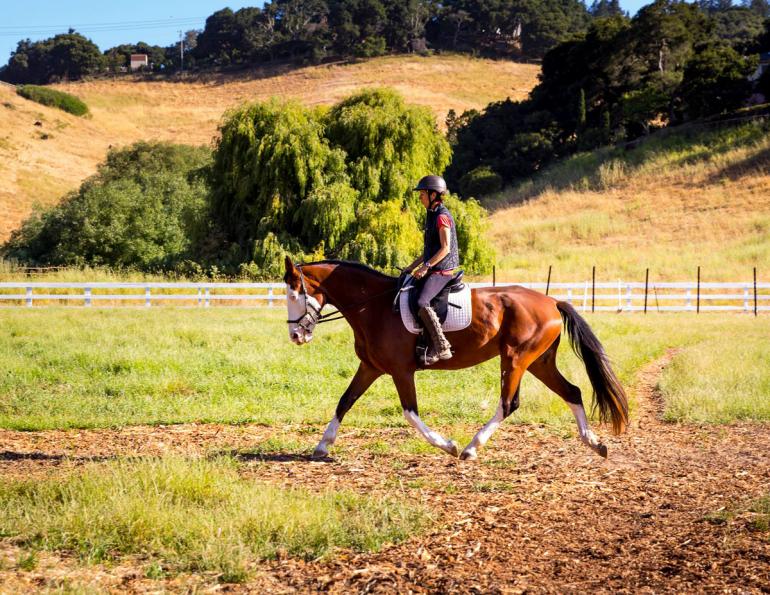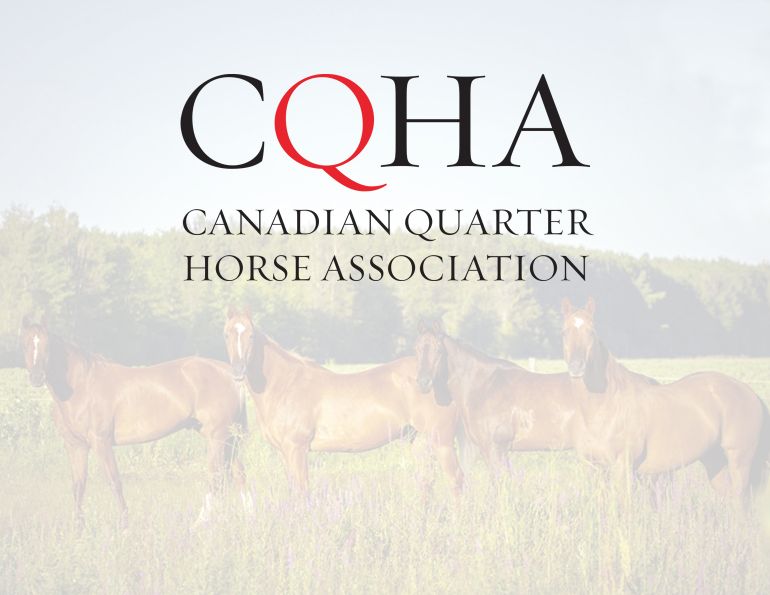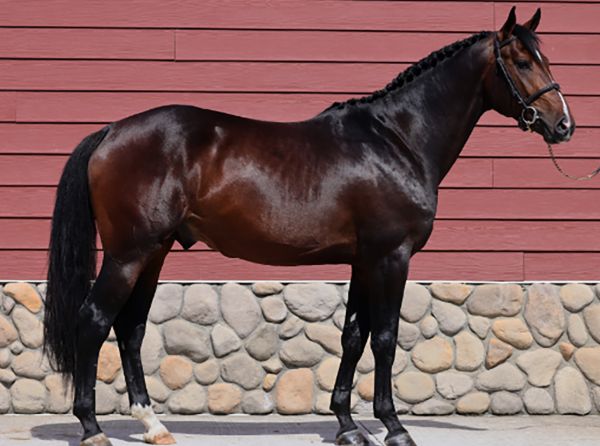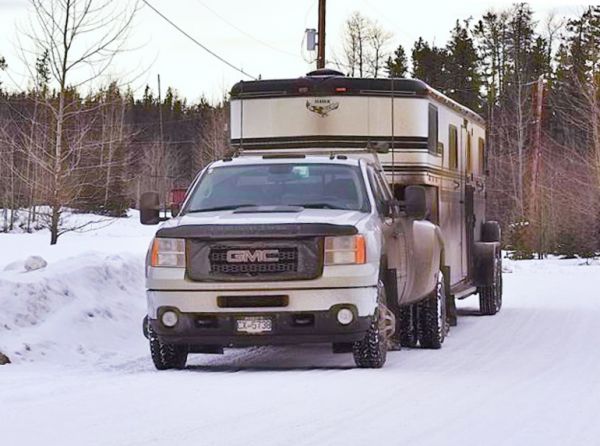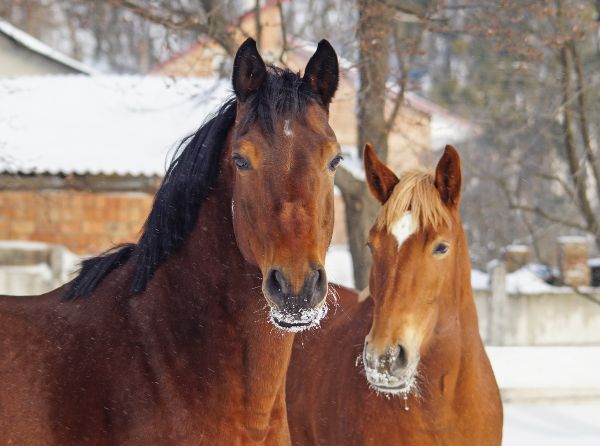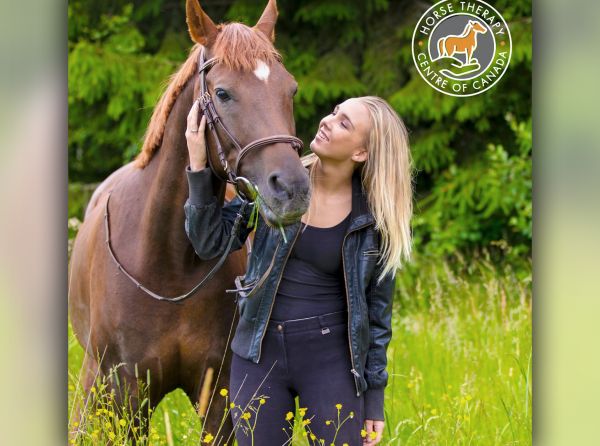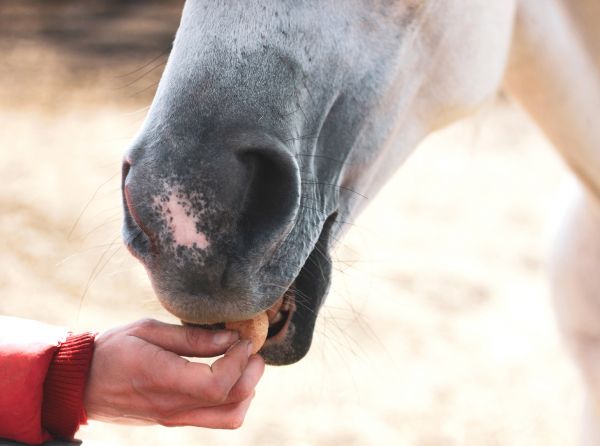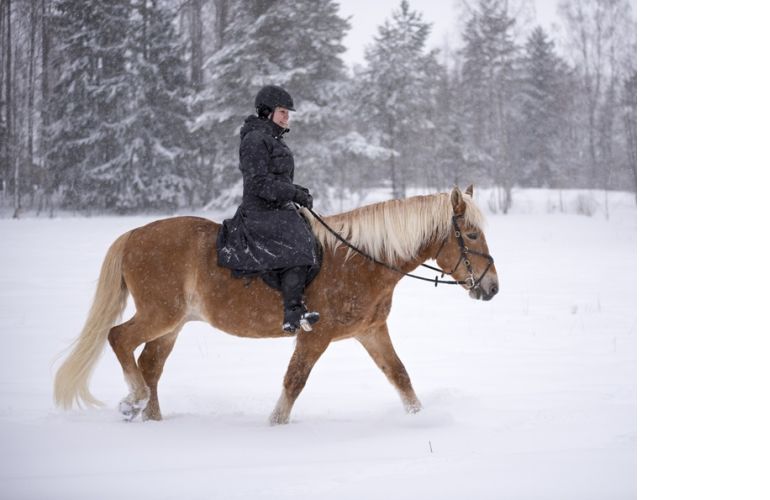- FEI Media
July 15, 2021 – Thirty-six horses flew into Japan last night – the first full cargo load of horses ever to land in Haneda, the waterfront airport that serves the greater Tokyo area and which is now welcoming a very different group of Olympic athletes.
“To see these horses arriving at Haneda airport is a truly historic occasion, and what makes it even more special is that these are not simply horses, they are Olympic horses,” Administrator of Tokyo International Airport Takahashi Koji said. “It’s a really big night for the airport, and particularly for the cargo team, and we see it as one of the major milestones of the final countdown to the Tokyo 2020 Olympic Games.”
The four-legged time travellers are all Equestrian Dressage horses and include some Olympic superstars, among them Bella Rose, the mare ridden by Germany’s Isabell Werth, the most decorated Olympic equestrian athlete of all time.

Dressage Groom Stefanie Wiegan (GER) greets Bella Rose at Bali Koen Equestrian Park, having just arrived from Haneda Airport in Tokyo, Japan, on July 15, 2021. Photo: FEI/Yusuke Nakanishi
Also landing at Haneda en route to the stunning equestrian venue at Baji Koen, owned by the Japan Racing Association, was Gio, the ride of double Olympic champion Charlotte Dujardin (GBR), who will be bidding for a three-in-a-row title in Tokyo.
The 36 equine passengers will be flying the flag for teams from Austria, Belgium, Denmark, Germany, Great Britain, Netherlands, Portugal, and host nation Japan, as well as individuals from Brazil, Estonia, Finland, Ireland and Morocco. And they will be joined by a further group of Equestrian Dressage stars flying into Tokyo the next day.
The first Olympic flight out of Europe saw the horses travelling from Liege in Belgium, flying on an Emirates SkyCargo Boeing 777-F to Dubai, a 90-minute refuel and crew change and then on to Tokyo.
Like human passengers, all horses travel with a passport. They will already have undergone a 60-day health surveillance period prior to a seven-day pre-export quarantine. They all also have an export health certificate and are thoroughly checked over by veterinarians prior to boarding.
The horses fly two per pallet, or flying stable, which is the equivalent of business class. Their comfort and safety are ensured by flying grooms and an on-board veterinarian.
A total of 325 horses will be flown into Tokyo across the Olympic and Paralympic Games and the complex logistics for this massive airlift have been coordinated by transport agents, Peden Bloodstock, which has been in charge of Olympic and Paralympic horse transport since Rome 1960 and is the Official Equine Logistics Partner of the Fédération Equestre Internationale (FEI), global governing body for equestrian sport. Peden Bloodstock became title partner of the FEI Best Athlete Award in 2019.
A convoy of 11 state-of-the-art air-conditioned horse trucks, owned by the Japanese Racing Association, transports the precious equine cargo and their equipment on the final transfer from Haneda to Baji Koen where the equine superstars then settle into their Olympic Athlete Village, aka the stables.
Flight Facts
- 18 hours 15 minutes – flight time Liege to Tokyo, with a touchdown in Dubai
- Aircraft detail: Emirates SkyCargo Boeing 777-F (flight numbers EK9388 LGG-DXB, EK9442 DXB-HND)
- 19 flying stables on-board
- Dimensions of the flying stables: 317cms long, 244cms wide, 233cms high
- On board temperature: 14-17 degrees Celsius
- 36 Dressage horses – teams from Austria, Belgium, Denmark, Germany, Great Britain, Netherlands, Portugal and host nation Japan, and individual horses from Brazil, Estonia, Finland, Ireland and Morocco.
- 22,700kgs +/- total weight of horses flying from Liege
- 13,500kgs of horse equipment
- 12,000 kgs of feed (not including in-flight meals & snacks)
- 40 litres of water per horse
Total Transport Trivia: both Olympic and Paralympic Games
- 247 - total number of horses travelling to Tokyo for the Olympic Games
- 78 – total number of horses travelling to Tokyo for the Paralympic Games
- 630kg – average weight of a Dressage horse; 515kg – average weight of an Eventing horse; 610kg – average weight of a Jumping horse
- 14 – total number of horse flights for the Tokyo 2020 Olympic Games
- 5 – total number of horse flights for the Tokyo 2020 Paralympic Games
- 100,000kgs - total weight of the horse equipment (including saddles, bridles, boots, bandages, rugs, lungeing equipment, headcollars, grooming kits, shoes & studs, wheelbarrows & pitch forks)
- 60,000kgs – total feed weight (feed/haylage)
- 185 – total number of truck journeys between Haneda airport and the equestrian park at Baji Koen
Haneda Airport (HND)
Haneda Airport handled over 87 million passengers in 2018, making it the third busiest airport in Asia and the fourth busiest in the world, after Atlanta, Beijing, and Dubai. Following expansion in 2018, Haneda is able to handle 90 million passengers per year – not counting horses!

Olympic dressage horses arrive at Haneda airport, Tokyo. Photo: FEI/Yusuke Nakanishi
Equestrian Sport at Tokyo 2020 Olympic Games
A record number of countries – 50 – will be competing in the equestrian events at the Tokyo 2020 Olympic Games following the introduction of new formats that limit teams to three members, meaning that more countries will have the opportunity to compete on the Olympic stage than ever before.
A total of seven countries will be fielding full teams in all three Olympic disciplines, including the host nation Japan. The others are Australia, France, Germany, Great Britain, Sweden, and United States of America.
Unique Gender Equality
Equestrian is the only sport in the Olympic movement in which men and women compete head-to-head throughout the Games, making it a totally gender-neutral sport. And the FEI doesn’t need a policy regarding transgender athletes as there are no requirements for our athletes to state their gender in order to participate in FEI competitions, or at the Olympic and Paralympic Games.
Equestrian is not a gender-affected sport that relies on the physical strength, stamina, and physique of an athlete as there are no gender-based biological advantages. Success in equestrian is largely determined by the unique bond between horse and athlete and refined communication with the horse.
Sustainability
Sustainability is a key theme across the Games, and equestrian is very much a part of that. In line with Pillar 1 of the IOC Sustainability Strategy: Minimum Environmental Burden, the redevelopment of the Japan Racing Association-owned Baji Koen Park as the equestrian venue for Tokyo 2020 has minimised environmental impact and ensured the legacy of the venue used for the Tokyo Games in 1964.
The Tokyo Organising Committee of the Olympic & Paralympic Games (TOCOG) has incorporated a further sustainability initiative into the equestrian venue with the incineration of used bedding from the horses’ stables for power generation.
And aligned with Pillar 2 of the IOC Sustainability Strategy: Urban environment plans harmonising with nature, only native species that integrate well with local flora and fauna have been planted at the Sea Forest cross-country venue. This includes the use of a native grass species, Zoysia japonica, for the footing on the course itself.
Olympic Equestrian
Olympic equestrian involves three disciplines, with a quota of 200 starters in total.
Countries per Olympic Discipline:
Equestrian Dressage (60 starters) – 30 National Olympic Committees (NOCs) represented: AUS, AUT, BEL, BRA, CAN, CHI, DEN, DOM, ESP, EST, FIN, FRA, GBR, GER, IRL, ITA, JPN, KOR, LUX, MAR, MEX, NED, POR, ROC, RSA, SGP, SUI, SWE, UKR & USA.
Equestrian Eventing (65 starters) – 29 NOCs represented: AUS, AUT, BEL, BLR, BRA, CAN, CHN, CZE, DEN, ECU, ESP, FRA, GBR, GER, HKG, IND, IRL, ITA, JPN, NED, NZL, POL, PUR, ROC, RSA, SUI, SWE, THA & USA.
Equestrian Show Jumping (75 starters) – 35 NOCs represented: ARG, AUS, BEL, BRA, CAN, CHI, CHN, COL, CZE, DEN, DOM, EGY, ESP, FRA, GBR, GER, IRL, ISR, ITA, JOR, JPN, LAT, MAR, MEX, NED, NOR, NZL, POR, SRI, SUI, SWE, SYR, TPE, UKR & USA.
Competition Dates
Equestrian Dressage – 24, 25 & 27 July (team final), 28 July (individual final)
Equestrian Eventing – 30 & 31 July (Dressage), 1 August (Cross Country), 2 August (Jumping – team & individual finals)
Equestrian Show Jumping – 3 & 4 August (individual final), 6 & 7 August (team final)
Paralympic Games
Paralympic Games: There is just one Paralympic discipline, Para Equestrian Dressage, with 78 starters.
Para Equestrian Dressage – 27 National Paralympic Committees represented: AUS, AUT, BEL, BRA, CAN, CZE, DEN, FIN, FRA, GBR, GER, HKG, IRL, ITA, JPN, KSA, LAT, MEX, NED, NOR, POR, RPC, RSA, SGP, SUI, SWE & USA.
A total of 16 countries will be fielding full teams.
Competition dates: Para Equestrian Dressage – 26-30 August
“Like all the athletes arriving into Tokyo for the Olympic and Paralympic Games, the horses are honed and ready to compete on the sporting world’s biggest stage,” FEI President Ingmar De Vos said. “After all the challenges the world has faced, finally we’re almost there and now it’s only a matter of days before we hear those magical words — Let the Games begin!”
Click HERE for more information on Equestrian at the Olympic Games.
Main Photo: The first full cargo load of horses ever to land in Tokyo’s Haneda airport ready for the Tokyo 2020 Olympic Games Equestrian competitions. Photo: FEI/Yusuke Nakanishi.





